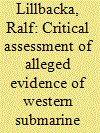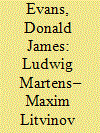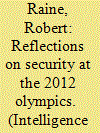| Srl | Item |
| 1 |
ID:
141630


|
|
|
|
|
| Summary/Abstract |
The submarine intrusions in Swedish territorial waters in the 1980s have received extensive attention. According to one theory, after the incident in 1981 when a Soviet submarine ran aground close to a Swedish naval base, Western submarines conducted subsequent intrusions as a psychological operation to affect Swedish foreign policy. In support of such claims, submarine observations and interviews with high-ranking Western officials have been put forth. However, the proposed evidence presented in Ola Tunander's article ‘Subs and PSYOPs’ in Intelligence and National Security can either be refuted or is inconclusive.
|
|
|
|
|
|
|
|
|
|
|
|
|
|
|
|
| 2 |
ID:
141631


|
|
|
|
|
| Summary/Abstract |
On 13 November 1934, the French military attaché to Berlin, General Renondeau, sent a dramatic report to the Head of the Army General Staff. This note compared the military ability of France to Germany. Renondeau violently attacked French conscripts, arguing teachers and the international had corrupted them. This article analyses this report, arguing that the internal political context of France was generally responsible for the alarmist tone. Domestic political turmoil led him to exaggerate the unreliability of French conscripts and underestimate the difficulties of the German army.
|
|
|
|
|
|
|
|
|
|
|
|
|
|
|
|
| 3 |
ID:
141628


|
|
|
|
|
| Summary/Abstract |
This article reexamines President Dwight D. Eisenhower's 1953 competitive review of Cold War strategy known as Project Solarium. It argues intelligence played a key role in this exercise and in the design of NSC 162/2, Eisenhower's ‘New Look’. Intelligence professionals were involved in all aspects of Project Solarium. Intelligence products provided a common baseline of analysis while stimulating debate. The process – a transparent system of structured deliberation among experts – encouraged a thorough consideration of intelligence and productive dissent. These findings underscore the need for a broader reexamination of the role of intelligence in the design of national security strategy.
|
|
|
|
|
|
|
|
|
|
|
|
|
|
|
|
| 4 |
ID:
141632


|
|
|
|
|
| Summary/Abstract |
John Gordon Coates was an intelligence instructor with 10 Commando, a force drawn from several European nations in the Second World War. His brief memoir together with supporting documents and oral histories throw light on the intelligence training of a unit whose memorialization has until now been patchy. 10 Commando's Troops (fighting units) were quartered in various Welsh villages according to nationality, for example the French in Criccieth, the Dutch in Porthmadog, and the relatively renowned Jewish group in Aberdyfi. They were dispatched in small numbers as specialist add-ons to military missions engaged in secret operations in occupied Europe, achieving success but a high casualty rate. In an embryonic way, 10 Commando could be regarded as an intelligence-orientated precursor to the idea of a European Union Rapid Reaction Force.
|
|
|
|
|
|
|
|
|
|
|
|
|
|
|
|
| 5 |
ID:
141627


|
|
|
|
|
| Summary/Abstract |
Research began when the author realized that Antony Sutton had misidentified the author of a key document published in his Wall Street and the Bolshevik Revolution (1974). This article reports on the interception by federal agents of the document (a letter) brought from the Copenhagen office of Soviet diplomat Maxim Litvinov and intended for Kenneth Durant who was employed by Ludwig Martens, Lenin's unrecognized representative in New York City. Analysis of the letter revealed the true author and opened a research channel for learning more about the backgrounds of three Soviet agents: Bornett Bobroff, Nora Hellgren, and Wilfred Humphries.
|
|
|
|
|
|
|
|
|
|
|
|
|
|
|
|
| 6 |
ID:
141626


|
|
|
|
|
| Summary/Abstract |
Securing the 2012 Olympic Games was the biggest security operation in the UK for nearly 70 years. It demanded levels of resources unparalleled in peacetime and involved the British Government much more deeply in strategy, planning and assurance for a domestic security operation than is usual. The UK's counter-terrorist strategy, CONTEST, provided the basic framework for the approach to Olympic security but steps were needed to mitigate all risks to the Games security. It was an exceptional level of inter-agency coordination and cooperation, rather than any new techniques, that lay behind the success of the security posture.
|
|
|
|
|
|
|
|
|
|
|
|
|
|
|
|
| 7 |
ID:
141629


|
|
|
|
|
| Summary/Abstract |
In June 1967, the Soviet Union abruptly cut off diplomatic relations with Israel and withdrew its embassy staff from Tel-Aviv, including its large KGB Rezidentura. To develop new sources of intelligence in Israel, the KGB recruited under duress hundreds of Russian Jews to spy in Israel in return for allowing their families to leave the Soviet Union. Most of these ‘recruits’ abandoned their task once they reached Israel, leaving Soviet intelligence with only a small number of agents in Israel who were handled by KGB illegal case officers working out of Russian churches. These agents were able to make careers in Israel and obtain some access to confidential military information, but generally failed to reach Israel's inner circle of political and military decision makers. This inner circle was only breached in 1983 by the treachery of a highly placed former Mossad officer who offered his services to the Soviets and became the KGB's best source for secret information deep inside the Israeli government.
|
|
|
|
|
|
|
|
|
|
|
|
|
|
|
|